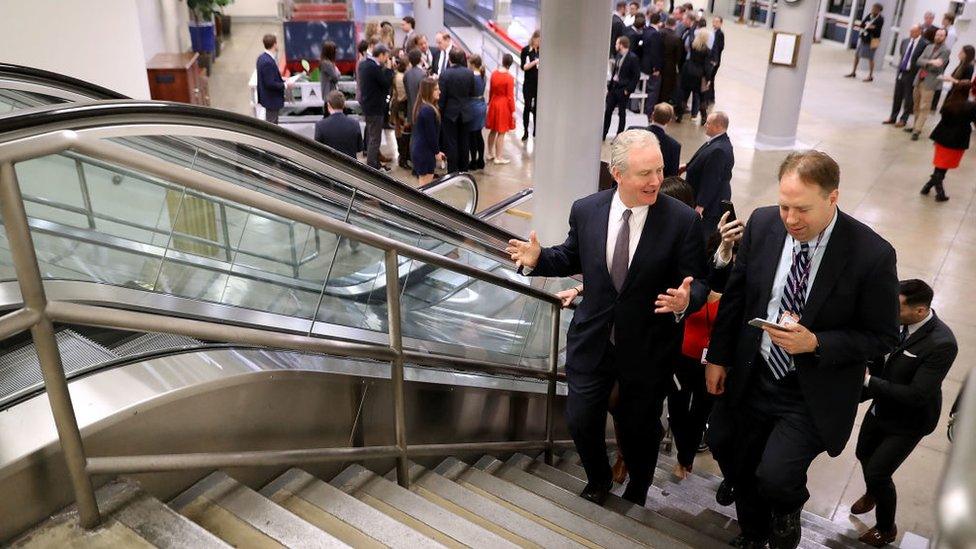Republican tax bill: House passes plan to Senate for final vote
- Published
US tax bill: the winners and losers
The Republican-controlled Congress is expected to confirm the most sweeping overhaul of the US tax system in more than three decades.
The House of Representatives approved the legislation comfortably on Tuesday, but the vote is likely to be closer in the Senate.
The bill looks set to mark the party's first major legislative triumph under President Donald Trump.
Critics say the package is a deficit-bloating giveaway to the super-rich.
But Republicans argue the tax cuts for corporations, small businesses and individuals will bolster economic growth.
Tuesday saw 12 Republicans and all Democratic members of the House oppose the bill, which passed by 227 votes to 203, to loud cheers and applause from Republicans in the chamber.
Speaker Paul Ryan said: "Today we are giving the people of this country their money back. This is their money after all!"
However, the House will have to vote again on Wednesday morning for procedural reasons, ahead of the planned signing into law of the bill by Mr Trump.
What is in the bill?
The bill - described by the president as a "Christmas gift" for the country and by Democratic congresswoman Barbara Lee as "a slap in the face to low- and middle-income families" - permanently cuts the tax rate for corporations from 35% to 21%.
It reduces the tax share paid by the wealthiest Americans, while awarding more modest reductions for most other income brackets.
Paul Ryan's exuberant gavelling reflects how long he's pushed for tax reform
Other key elements include:
Lower individual tax rates, albeit temporarily
Less inheritance tax
An expanded child tax credit
Lower taxes on overseas profits
The legislation would add as much as $1.4tn (£1tn) to the $20tn national debt over 10 years, the non-partisan Joint Committee on Taxation says.
What happens next?
Senators have now begun voting on the bill, as demonstrators in the gallery attempted to disrupt proceedings, shouting: "Kill the bill!"
US Vice-President Mike Pence has postponed a Middle East trip in case he is needed to cast a tie-breaking vote to ensure the measure clears the Senate.
In the upper chamber, which Republicans control by 52-48, the party can afford to lose support from no more than two votes.

Republicans are hoping to pass the bill before going on holiday break
On Monday, two of the last Senate Republican holdouts, Susan Collins and Mike Lee, agreed to support the legislation.
Senator Jeff Flake remained undecided late on Monday. Senator John McCain, who has brain cancer, is with his family in Arizona.
Another Republican senator, Bob Corker, meanwhile, denied his change of heart in favour of the bill had been motivated by a tax deduction that could benefit his real estate investments.
The Tennessean had long been opposed to the tax bill because of projections it would add to the federal deficit.
But on Friday Mr Corker dropped his objections as a provision was added offering a 20% deduction on certain property income.
On Monday, he denied switching sides because he could benefit personally from the legislation.
Why is this bill important?
Aside from the tax changes that will affect most Americans, Republicans have been eager to prove they can govern after their attempts to repeal and replace the Affordable Care Act collapsed during the summer.
The tax bill continues the party's attempts to dismantle the 2010 law known as Obamacare by scrapping a fine it imposes on Americans who do not buy health insurance.
With an eye on next year's mid-term elections, Democrats argue that the tax package will further expand the US income gap between rich and poor.